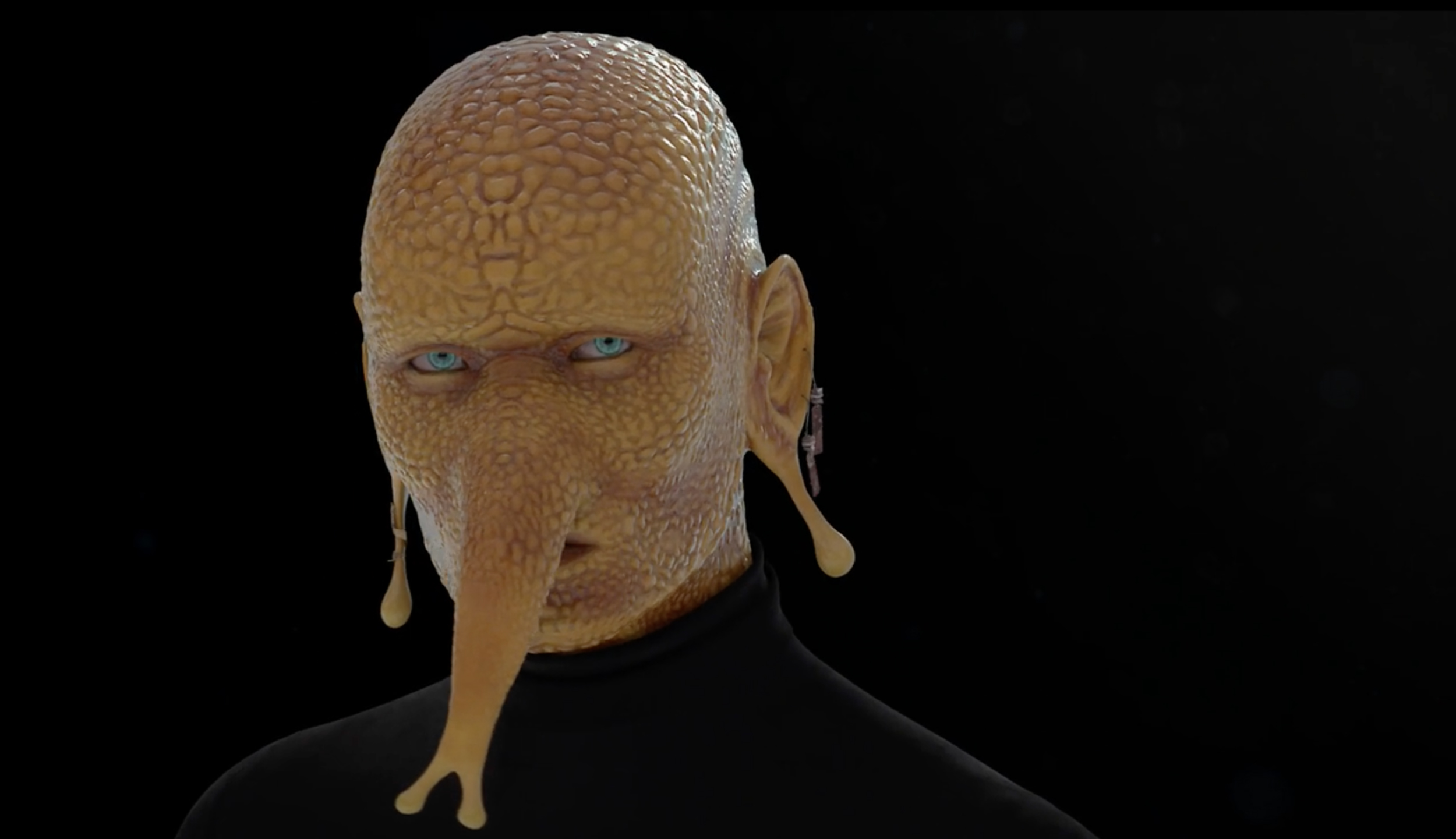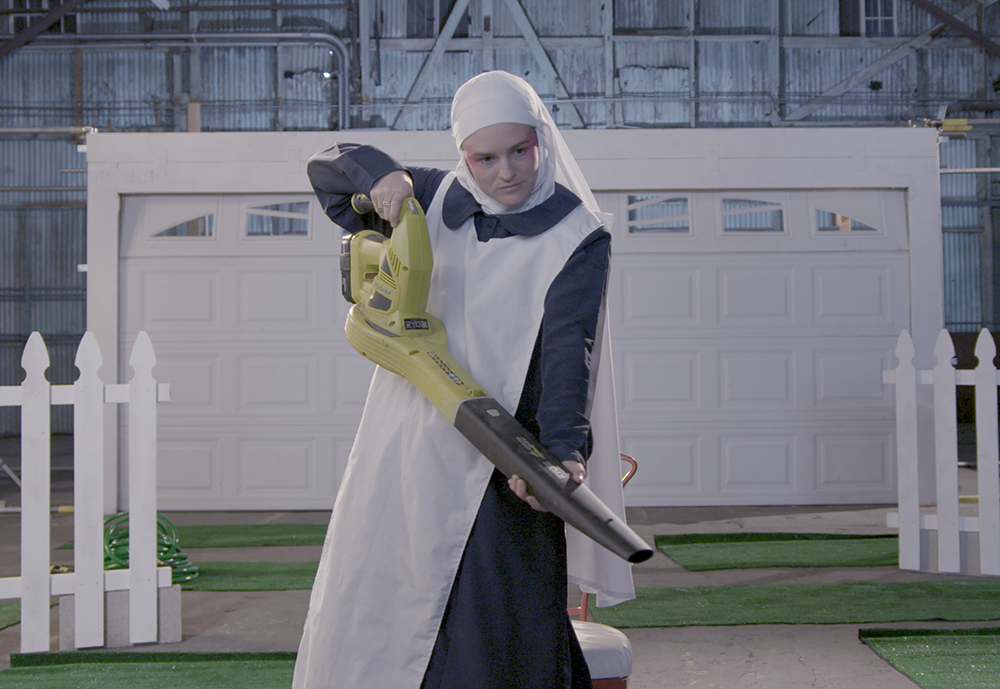
Groundbreaking New York-based artists’ collective opens video exhibition during CPH: DOX
The internationally renowned artists’ collective DIS, who curated the 9th Berlin Biennale, are now coming to Copenhagen. The exhibition DIS presents: What Do People Do All Day? shows a selection of spectacular video works from the newly developed video platform dis.art as well as cinematic settings and installations that question the future of society – and what we humans do in our everyday lives to influence that future. The exhibition is created by Kunsthal Charlottenborg in collaboration with Tranen – Space for Contemporary Art and opens on Thursday, 19 March 2020 5-10pm as part of CPH: DOX.
Through the medium of film, the video platform dis.art aims to convey a range of ideas conjured up by artists, filmmakers and thinkers, all of which posit the future of learning as edutainment. At the exhibition DIS presents: What Do People Do All Day? visitors can experience a selection of films from dis.art that highlight DIS’s current fixations: the nature of ‘belonging’ in a rootless, networked world; the advent of suburbia; artificial intelligence; the relationships between technology, vision, and power; and the future of work:
‘The environment is collapsing and we spend our days clicking and scrolling, recirculating images and rarely reading beyond headlines, while the deeper story becomes increasingly impossible to grasp. Despite our technocapitalist present, people still serve meals, clean spaces and transport things from one place to another’. – DIS, New York
The title What Do People Do All Day? is taken from Simon Dybbroe Møller’s new episodic series, a contemporary update to Richard Scarry’s 1968 children’s book of the same name in which cute animal characters embody their straightforward professions. Simon Dybroe Møller has just been appointed Professor at the Royal Danish Academy of Fine Arts’ Sculpture School in the autumn of 2019 and contributes a new work to the exhibition.
Juxtaposing surface and complexity, past and futurity, pedagogy and art, the exhibition poses this highly pertinent question – what do people do all day? – in order to point out the passivity of our current era and to actively inquire what should be done.
Participating artists:
Hannah Black (UK), Derek Larson (USA), Jacob Hurwitz-Goodman (USA), Ilana Harris-Babou (USA), Will Benedict (USA) & Steffen Jørgensen (Denmark), Olivia Erlanger (USA) & Luis Ortega Govela (Mexico), Meriem Bennani (Morocco), Simon Dybbroe Møller (Denmark), Theo Anthony (USA), DIS (USA), and more.

The unboxing video is one of the more perverse capitalistic thrills—watching strangers open packages and show off their online purchases. In What’s in the Box? with Hannah Black (2018), artist Hannah Black turns this consumptive voyeurism on its head, revealing allegorical products and unpacking urgent ideas with special guests, like Zahira Kelly (@bad_dominicana), from behind her desk in this late night style talk show.
Derek Larson’s Très Mall (2019) is a serious cartoon about three young artists from Savannah, Georgia. Although the protagonist, Jon, and his friends may seem like disaffected, squatters driven less by political motivations and more financial limitations, they ask some of today’s most important questions: Can we invent a new kind of love? What do objects experience? Do animals have morality? What violence does the screen inflict? How much connection is too much connection? Do we need another remake of Stargate, again?
Jacob Hurwitz-Goodman’s Early Stage (2019) lets artificial intelligence speak for itself so we don’t have to wonder what they think of us: Do they worship us? Pity us? Are we pathetic for asking that? The A.I. embodied in Casey Jane Ellison wants us to know she’s in charge. Yeah, we can click pause but we’re just an ugly mass of cells that evolved for billions of years out of some primordial swamp. We didn’t create anything, we just gave way for the conditions for new intelligences to be born.
What better site for a 21st-century cooking show than a tower of nothing but eateries? In The Restaurant (2018-20) by Will Benedict and Steffen Jørgensen we get one possible take on what the future of food culture might be like. With pickled cop cars, blood ketchup, and Drano-based concoctions, there is certainly something for everyone in this gastronomic high rise and plenty of new kitchen tricks to learn from this otherworldly cooking show.
Reparation Hardware (2017), by Ilana Harris-Babou, is at once a furniture restoration tutorial, and a proposal for the delivery of reparations to African-Americans. She asks “what makes the idea of reparations for African Americans so terrifying?” Perhaps because reparations acknowledge the failure of the American Dream. That there is something here that needs to be repaired and reclaimed.
In a fictional documentary inspired by reality television, Mission Teens: French School in Morocco (2019), artist Meriem Bennani follows a group of students from the Lycée Descartes, the French high school in Rabat as they go about their daily lives and reflect on an education system inherited from French colonialism. Through the questioning, reflections, and aspirations of the students, the artist, or rather the donkey—her animated avatar behind the camera—investigates the issue of forming one’s identity between two cultures and two ages.
Simon Dybbroe Møller’s series What Do People Do All Day? (2020) provides a contemporary update to Richard Scarry’s 1968 children’s book of the same name in a new series, bringing together the idealistic “everybody is a worker” ethos of Scarry’s fictional Busytown and the “everything is work” reality of technocapitalism. Replacing the original’s drawings of cute anthropomorphized animals doing people-things in industrious and purposeful Busytown, with real-life neurotic humans operating in the schizophrenic terrain of the twenty-first century.
In 2016, the Baltimore Police Department implemented a program to equip all police officers with a body camera. Before receiving their cameras, officers were required to take a four-hour class outlining policy and procedures. Out of this course comes Neutral Witness (2020) by Theo Anthony. While the class attempts to recode cinematic language into police protocol, viewers become attuned to the gaps, elisions, and silences that fracture the neutral testimony of the body camera.
Steve Jobs and Steve Wozniak started Apple Computer in a garage. Suburban men turned garages into man caves to escape from family life. Nirvana and No Doubt played their first chords as garage bands. Olivia Erlanger and Luis Ortega Govela explore this legacy in GARAGE (2019) through a series of skits with the help of actress Aubrey Plaza, visits from Frank Lloyd Wright, and the Sisters of the Valley—a group of entrepreneurial weed-growing nuns.
Beyond these titles, there are several works by DIS, including General Intellects with McKenzie Wark (2018), UBI: The Straight Truvada (2018), and Circle Time: What is Money? (2017).
DIS consists of Lauren Boyle, Solomon Chase, Marco Roso and David Toro. Created in 2010, the artists’ collective has previously been part of the New Museum Triennial Surround Audience (2015), the group exhibition Co-Workers at the Musée Moderne de la Ville de Paris (2015) and the New Photography show at the MoMA in New York (2015). The collective has curated the 9th Berlin Biennale for Contemporary Art The Present in Drag (2016), participated in the group exhibition I was Raised on the Internet at MCA in Chicago (2018), curated and participated in Genre-Nonconforming: The DIS Edutainment Network at the De Young in San Francisco (2017-18), Thumbs that Type and Swipe at Casa Encendida in Madrid (2018), and A Good Crisis at the Baltimore Museum of Art (2018).
DIS presents: What Do People Do All Day? is curated by DIS, created in collaboration with Tranen – Rum for Samtidskunst and presented in collaboration with CPH:DOX.
The exhibition is supported by Augustinus Fonden, Beckett-Fonden, Knud Højgaards Fond, Det Obelske Familiefond, Statens Kunstfond, and sponsored by Egetæpper and Genbyg.
Part of CPH:DOX at Kunsthal Charlottenborg
The exhibition is presented in collaboration with CPH:DOX which will, for the fourth time now, transform Kunsthal Charlottenborg into a festival mansion and headquarters for this year’s edition of one of the world’s most acclaimed documentary film festivals, taking place from 18 to 29 March 2020. The exhibition DIS presents: What Do People Do All Day? opens 19 March, and in addition to the exhibition, the festival will present screenings, debates, concerts, business forums and a virtual reality cinema at Kunsthal Charlottenborg. More about CPH:DOX.
Facts about the exhibition
DIS presents: What Do People Do All Day?
20 March – 9 August 2020
Opening: Thursday 19 March 5.00–10.00pm
Kunsthal Charlottenborg, Kongens Nytorv 1, 1050 Copenhagen K
Admission: DKK 90 (free admission at the opening and during CPH:DOX)
More about the exhibition.
Special opening hours during CPH:DOX
During CPH:DOX 18 – 29 March 2020, Kunsthal Charlottenborg is open every day from 10am to 10pm. Kunsthal Charlottenborg will be closed 30 March – 4 April 2020, after which the standard opening hours apply from 5 April onwards: Tue-Fri 12noon–8pm, Sat-Sun 11am–5pm.